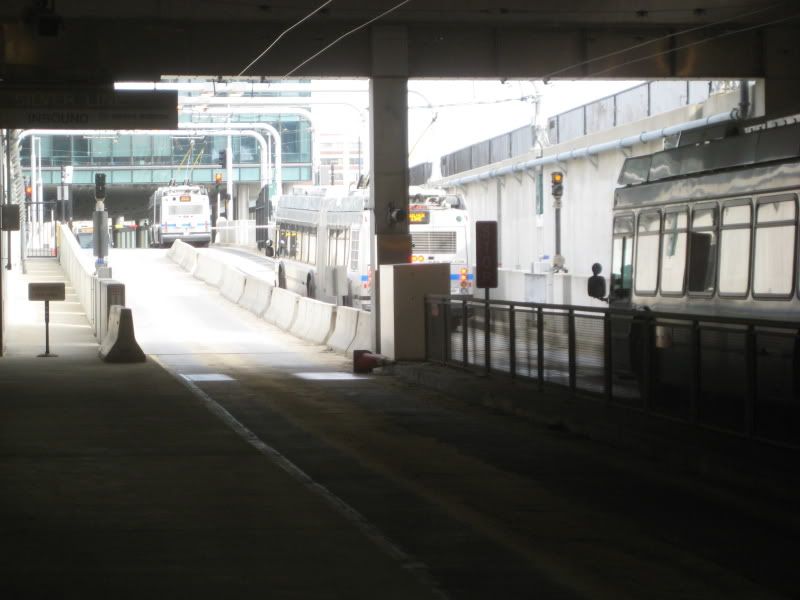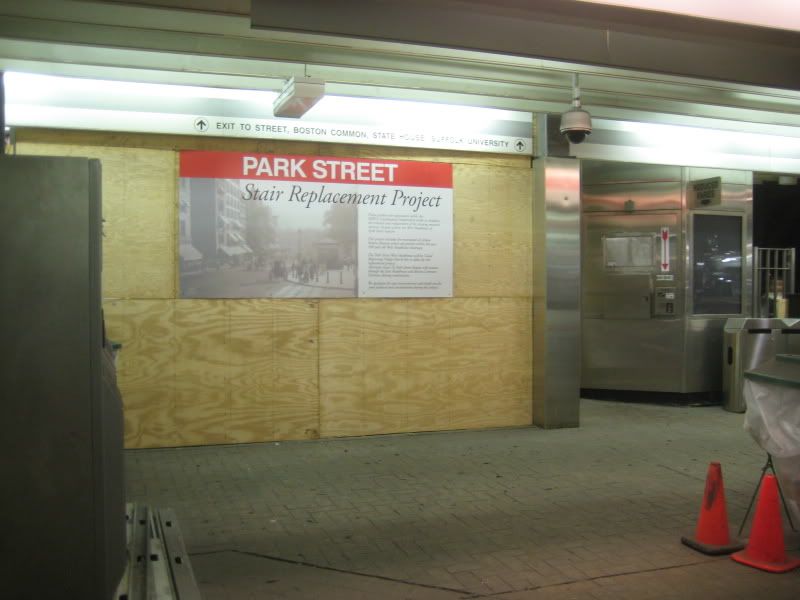A few notes on the impending financial collapse of the Massachusetts Bay Transportation Authority
April 13th, 2009
by Bill
This is a crisis I knew had to come,
Destroying the balance I?d kept.
Doubting, unsettling and turning around,
Wondering what will come next.
- Joy Division ?Passover?
What better way to begin a post on the financial ruin of the MBTA than with a quote from the band that made hearing about urban decay and alienation enjoyable.
The T has been doomed for years. That much is certain. While many have, and continue to lay the blame at his feet, Dan Grabauskas could not possibly change the course of the authority?s fortunes. The problems it faces are structural on a level that cannot be easily remedied.
Problem 1: The MBTA is not in the business of moving passengers
Really. The primary role of the MBTA is to create jobs. Jobs for MBTA employees. Ex-MBTA employees. The agency is notorious for letting wages spiral out of control and for offering extraordinarily generous benefits to former employees. Want to retire with a full pension after 23 years, no matter how old you are? Work for the MBTA.
Want to make $100,000 more than the General Manager of the MBTA who himself makes $100,000 more than the Governor of Massachusetts?
Be the ex-General Manager of the MBTA - and manage the MBTA Retirement Fund no less.
The MBTA plans to pay $120,449,427 more in wages during FY2009 than it did in 2001, along with an additional $68,245,737 in fringe benefits. If you adjust that for inflation, it?s an increase of $47,832,325.37 in wages and $43,448,759.15 in benefits, with the current employee commitments well over half a billion dollars at an astonishing $609,864,740 for 2009.
Now I don?t have the breakdown of how many employees have been assigned for the past eight years, but it?s clear that employee costs are spiraling upwards. The two most obvious questions are: does this reflect improved staffing that has allowed for a measurable improvement in service to the public, and how can this be considered sustainable? I?ll leave you to answer those on your own.
Problem 2: The Big Dig
As part of blowing untold billions (as the numbers are still a little fuzzy) on The Big Dig, the state was forced to make legally-binding commitments to mitigate the environmental impact of the highway building frenzy.
A slightly abridged version of the list that can be found here:
? Silver Line Phase I: Washington Street Replacement Service.
? Silver Line Phase II: South Boston Transitway and Airport Extension.
? Silver Line Phase III: Substitution project requirement for failure to gain funding by 2005.If funding
for Phase III of the Silver Line is not secured by 2005, other urban transportation investments must be
undertaken. No substitute projects have been identified despite the failure to secure federal funding for
Silver Line Phase III.
? Orange Line: 18 Additional Cars and Signal System Improvements.
? Blue Line Platform Lengthening to accommodate 6-car trains.
? Arborway Restoration. Restoration of Green Line service along the Arborway Line in Jamaica Plain.
? Construction Equipment Retrofit Program: Massachusetts Highway Department.
? Greenbush: Restoring the Old Colony Line from Weymouth to Hingham.
? Upgrading the bus fleet.
? TF Green Rail Service.
? Promote Signalization Technology. Promote traffic signalization technology to give priority to mass
transit vehicles over automobiles within the metropolitan-Boston area.
? Funding Prioritization.
? Red/Blue Line Connector at Charles/MGH.
? Green Line extension to Medford Hills through Somerville.
- Blue Line Station Modernization
A lot of these happened, and a lot were simply ignored (keep that in mind the next time the state says Silver Line Phase III must happen). But the ones that did happen cost the state huge sums of money. The costs incurred were transferred to the MBTA as part of its new forward funding protocol.
Not only was the list of absolutely legally-binding commitments cherry-picked for projects The Powers That Be felt like completing, the buck was passed on. What?s a few billion extra in debt service payments anyway?
Problem 3: The Sales Tax
1% of the sales tax goes to the MBTA. You probably already knew this. If you live in Western Mass you certainly knew this and are undoubtably angry about it. That?s fine, but let?s take a second and look at why tying MBTA revenues to a source prone to random variations was a bad idea.
Actually, no. Why bother. This is as bad as taking the time to really ponder why giving out NINJA loans to people was a bad call. NINJA loans at variable APRs no less.
?Here is a ton of debt and a gamble that the economy will never go south. Have fun!?
Problem 4: Fare Collection
Hey look, it?s not happening again. Fare collection does not happen on the Green Line surface branches. A few half-assed attempts are made now and then, but let?s face it. The T does not collect fares on the Green Line and everyone knows it. It plays it off with the tired ?But everyone has a pass!? line that does not hold water. Anecdotal as it may be, the odd motorperson who only opens the front doors to a train causes the line of people to fish around for cash. Something they usually wait and do at the last possible moment. The T is considering CharlieCard readers at the back doors of Green Line trains, but those will be quickly defeated by the devious scam known as walking right past them.
Speaking of which, the failed fare gate design not only cost the T millions, but it ripped a hole in its nearly empty wallet for good measure. It?s rare when I don?t see two or three people go through a fare gate at once. I?ve seen five succeed before. I?ve also been shoved up against a fare gate in full view of an uninterested CSR so a fare evader could steamroll past me.
Problem 5: Ineffective Construction Management
The MBTA hates to build things. That?s why the much of the Urban Ring is going to dump buses on surface streets and call it a day. It costs a lot of money to build infrastructure, and costs more money to maintain it. You can paint ?Bus Lane? on a street for a lot less than it takes to build a tunnel or keep it from surrendering to the elements.
Take a trip on the Silver Line Waterfront and you?ll find lovely stations the likes of which have never been seen before in Boston. If something similar has been seen before, rest assured it was destroyed in the name of progress between 1950 and 1970. But I digress, the stations are huge, expensive and in good shape. That?s because nobody really uses them.
The tunnels are a different story. Buses are constantly driving through them, and through water - which will probably do wonders for the mechanical systems on each vehicle. This is because the tunnels are flooded 24/7. It doesn?t help that the pavement is rutted and it feels as though you?re driving on a dirt road. Very slowly.
Kenmore is nearly complete after tens of millions of dollars in overruns and years of delays, but the lobby has the fit and finish of Soviet housing project, and the tiles are beginning to crumble. The lovely glass bus shelter is supplemented by a collection of standard street corner style bus shelters you would find anywhere else in the city. These are the structures that actually shelter passengers from the elements. The canopy is still incomplete almost two years after assembly began, and the design does not take into account winds coming in off that Atlantic Ocean thing, nor does it shelter passengers waiting for the #57 bus - the most popular by far.
Arlington is a repeat of Kenmore with delays and overruns combined with a lack of progress. The new platform should be open by mid-May, but my Spidey Sense is telling me there is no hope for the escalator arriving anytime soon. The new platform will also mean the side presently open will need to be shuttered for a year or two or whatever. Even though the T did that once already.
Copley nearly destroyed a church when it finally came time to do some work after millions of dollars and a few years spent thinking about it. What more needs to be said? Perhaps that all construction has been halted, not just the religious institution destroying kind. I?m sure there is something that could be done somewhere on some side of the station that does not need to wait for a seismic survey. Maybe finish stripping paint of the walls. The layers of flaking, probably leady goodness that have been embarrassing the city in front of tourists since 2006.
The T has forgotten how to manage a construction project, and each new task results in a rapidly ballooning budget and timeframe. The finished products rarely seem to instill confidence that they will last once faced with normal wear and tear.
Problem 6: The Bubble
When you find out the head of the MBTA doesn?t use the MBTA to get to work you begin to realize that it?s not entirely unlikely that the rest of the top echelon of managers couldn?t find there way to Chiswick Rd. if you asked them to take a train there.
It became clear a long time ago that management is out of touch with the day to day realities of using the system. When you?re out of touch it?s impossible to spend money effectively. If you don?t know how the system works, and how it doesn?t, you can?t hope to run it.
Solution
First and foremost, the transportation agencies in the state need to be merged. I mean come on. A Highway Authority and a Turnpike Authority? How about we create an Avenue Authority and an Alley Authority too, just for kicks and kickbacks.
The state needs to take back some of the debt it threw at the MBTA. It pulled the equivalent of tossing your kids your credit card bills. Time to fix that.
Yes, the gas tax will need to rise. It sucks, but infrastructure is not free, and it?s not as though the roads are the kind of magical self-sustaining entities that are unsubsidized by the taxpayer as anti-transit activists often portray them.
Beyond that there is really there is nothing left but to audit the MBTA. Use an outside firm with absolutely no ties to the MBTA, EOT, State House, etc to do a top-to-bottom inventory of every project, every dollar and every employee. Force a cold, hard evaluation of each person?s role within the organization and how well they perform their duties. Terminate employment as necessary. Reform the pension plan.
Now that may sound harsh, and perhaps unnecessarily so. But there is one thing that I?m certain of, and that?s given the mismanagement, the patronage, etc endemic to the agency, the worst job in the whole world is being a good employee at the MBTA. There is little motivation to really care as the public looks down on you and every day it?s possible to watch the rest of the authority slowly unravel in front of your face.


